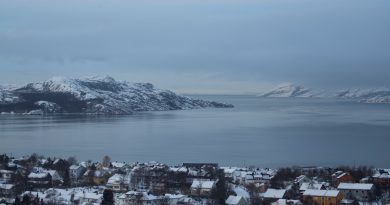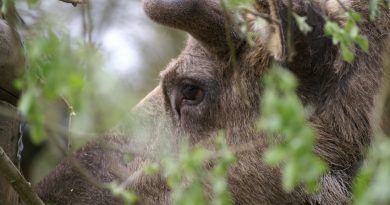Sámi Opposition to Giant Wind Farms
Listen: {play}/media/jukebox/radio-sweden-windfarmnov25.MP3
One of the largest wind farms in the world is being built in northern Sweden but not everyone is pleased about it. The turbines cut across an area used by Sweden’s indigenous Sámi reindeer herders.
An hour’s drive inland from the town of Piteå, a dozen wind turbines tower over the surrounding forest. In the next few years 1,101 turbines will be erected here at a cost of $8.2 billion.
Equivalent to two nuclear reactors
“This plateau has really good wind conditions – that’s the main reason it’s being built here,” said Jonas Lundmark from the local council.
“Also 95 percent of the land is owned by two forestry companies and there has been a steady decline in the population over the last 50 years. People living here are very keen to get more business into the area.”
By 2020, the wind farm is expected to provide about half of the national target for new wind energy – about 12 terawatt hours – that’s roughly the equivalent of two Swedish nuclear reactors, according to the company building the wind farm.
Wind power is a high priority for the Swedish government, and the local power to veto planning applications for wind farms has been removed to pave the way for more of them.
Stefan Lundmark, from the Swedish ministry of enterprise and energy says that the trend across the Nordic countries is to build in northern, more sparsely populated areas.
Sámi reindeer herders losing grazing land
“I think that the wind farms will be bigger and bigger and most of them will be in northern Sweden. In the south it’s more densely populated and there are more competing interests,” he said.
Leaving the wind farm traffic, the only traffic I met on the newly paved road was a herd of reindeer that shot out in front of the car, forcing me to stop. With the low winter sun I almost failed to see them until it was too late.
The new road winds through the Sámi reindeer herding lands, and the local herders say it will limit their movements and endanger their animals. They are locked in a dispute over compensation with the company building the wind farm – they say they were never properly consulted before the building got underway.
Ingrid Inger, president of the Sámi Parliament, says this is just the latest chapter in a longstanding struggle between Sámi reindeer herders and industrial interests.
“We’re not against wind power – but we are against big wind farms like Markbydgen because they affect the reindeer business – the local Sámi herders will lose about a quarter of their winter grazing land. That’s really reprehensible from our point of view,” she said.
Inger says that Sámi herding communities should be consulted before giant wind farms are built, which she says did not happen in Markbygden.
She explains that reindeer herders need to move their herds between seasonal grazing lands – often across long distances – during the year. But increasing demands on the land from other economic interests is making that more and more difficult, and is leading to the closure of traditional Sámi businesses.
National interest versus Sámi rights
“The government can take over land earmarked for reindeer grazing – if it’s in the national interest. You have mining, hydro power, forestry and now wind power – each of them competing for land used by Sámi herders – and it all adds up.
Svevind, the company building the windfarm say that they have consulted the Sámi and that they are willing to pay appropriate compensation.
But Sámi grievances run deep – there is a long history in the region of what is perceived as land-grabbing by government and industrial interest, explained Patrick Lantto, an historian at the Centre for Sámi Research in Umeå.
Although the Sámi are protected by a law which gives them the right to grazing lands across vast stretched of the north of the country, Lantto says its does not add up to much in practice as it’s next to impossible for herders to prove they have been using the land.
And despite some recent court rulings in their favour, it would seem that the odds are against them.
“There’s a strong sentiment that reindeer husbandry could prevent development in the north,” he said.
“In a recent case the environmental court clearly stated that Sweden has a goal of increasing it’s percentage of renewable energy and this is a goal which ways more heavily than protecting the rights of reindeer herders.”




